
THE FUTURE OF HEALTH CARE IS NOT ABOUT HELPING MORE SICK PEOPLE GET BETTER, IT IS ABOUT HAVING FEWER PEOPLE GETTING SICK.



THE FUTURE OF HEALTH CARE IS NOT ABOUT HELPING MORE SICK PEOPLE GET BETTER, IT IS ABOUT HAVING FEWER PEOPLE GETTING SICK.

That’s the difference in life expectancy between zip code 46201 and 46250…and that gap is widening. Despite the fact we live in a region where health care options are abundant, right here in our midst, our underserved continue to suffer at globally disproportionate rates. The future of health care is not about helping more sick people get better, it is about having fewer people getting sick.
Eskenazi Health will deliberately focus on a comprehensive intervention to aggressively move the needle on health disparities. The new hospital laid the foundation for holistic patient care and this is the next step.
BARTPETERSON Former Mayor, City of Indianapolis President and CEO, Christel House International
TRANSFORMING BOTH REQUIRES SOLVING THE UNDERLYING SOCIAL PROBLEMS IMPACTING WELLBEING—OFTEN TERMED SOCIAL DETERMINANTS OF HEALTH.
Those living in poverty disproportionately face so many health challenges. Challenges such as disability, mental health, medical issues and substance use disorder impede education and job opportunities, limit child and adult brain development, contribute to violence in our city and reduce quality of life.
Change will not happen quickly. But it must start now.
The campaign launches a commitment to generational change—collaboratively improving life expectancy in Indianapolis.
The goal is to leverage the Eskenazi Health strengths and partnerships through a first-of-its-kind integrated and sustainable model to create life expectancy equity for everyone in Indianapolis.


CAMPAIGN GOAL: $60 MILLION
The neighborhoods served by Eskenazi Health are home to many of the city’s highest need residents. On the east side, a new primary care center of the future will be built to serve as the hub for a Health Equity Zone. Two existing Eskenazi Health Center clinics will anchor two additional Health Equity Zones. The campaign will support programming demands as well as innovation and technology.
The COVID-19 pandemic has accelerated the already alarming rates of mental illness in Indiana. Since January 2020, there has been a 70% increase in self harm and suicidal ideation, an 80% increase in drug overdoses and a 430% increase in domestic violence calls. The campaign will sustain provider recruitment, upgrade facilities and expand the Behavioral Health Academy.
In Indianapolis, 41% of children under the age of five suffer from malnutrition. Philanthropic dollars will strengthen screening to identify individuals in need, grow distribution capabilities with community partners and encourage hands-on educational programs that provide food and information on healthy eating.
Change won’t happen overnight, but we believe there is a moral imperative to this work.J. MARK HOWELL President and CEO, Retired, Conexus Indiana
80% OF OUR HEALTH IS SHAPED BY SOCIAL DETERMINANTS OF HEALTH. PUT ANOTHER WAY, MEDICAL CARE TRADITIONALLY DELIVERED CONTRIBUTES ONLY 20% TO REDUCING PREMATURE DEATH. TO RADICALLY TRANSFORM OUTCOMES, ESKENAZI HEALTH MUST INTEGRATE MEDICAL CARE WITH SOCIAL CARE. THIS CAMPAIGN REPRESENTS A DELIBERATE DECISION TO FOCUS PHILANTHROPY AT THE POINT OF GREATEST OPPORTUNITY.
SOCIOECONOMIC FACTORS
• Education
• Job Status
• Income
HEALTH BEHAVIORS
• Tobacco Use
• Diet & Exercise
• Family Social Support
• Community Safety 40%
• Access to Care • Quality of Care
• Alcohol Use • Sexual Activity PHYSICAL ENVIRONMENT
• Housing
Parks & Green Space
• Transportation • Neighborhood Walkability
JENNIFER'S STORY ILLUSTRATES HEALTH CARE'S DYSFUNCTION FOR SO MANY PEOPLE. SERVICES ARE AVAILABLE BUT DISCONNECTED, AND OFTEN JUST OUT OF REACH.
My name is Jennifer and I live in Little Flower. I am 37 years old and the mother of two amazing girls. Harper is 11 and my baby, Aria, just turned two months. Today is Aria’s well-child appointment and she appears to be healthy and growing! When we arrived, I was given a paper questionnaire focused on how I am coping as a mother.
I could not stop my tears when our pediatrician sat down to talk with me. The truth is I AM NOT OKAY! My daughters are NOT OKAY! I feel like an awful mother. I lie awake every night thinking about taking my own life, wondering if my daughters would be better off without me.
While I was pregnant with Aria, my husband, Isaiah, was electrocuted while cutting down tree branches, and he died. I delivered our beautiful daughter nine weeks premature. I am still grieving and desperate, barely making it through each day.
I haven’t had any new diapers for two days. I’m trying my best to make the ones I have stretch, lining them with paper towels from the nearby gas station.
Isaiah’s job provided our family’s only income. Without it, we lost our home. Someone I recently met has given us a place to sleep, but there is another young man here who uses and sells drugs. I am afraid for myself and my girls. Harper doesn’t attend school because we can’t use the address.
Here’s the worst part: I haven’t had any new diapers for two days. I’m trying my best to make the ones I have stretch, lining them with paper towels from the nearby gas station. I saved the last clean diaper for today’s appointment. Now she has an intense diaper rash.
Our pediatrician was very kind and listened as I told her what our life is like. After a big hug, she encouraged me and reassured me that I am a wonderful mother. She placed a referral for both mental health and social work to call me. When I got home, I realized they won’t be able to help me—I didn’t pay my cell phone bill and my phone doesn't have service.
Continued on page 18

Eskenazi Health is leading the charge in redefining health care. We know clinical care accounts for only about 20% of what contributes to someone’s life expectancy and quality of life; this is the focus of traditional medical care.
By integrating medical care with social care, which addresses social and economic factors, physical environment and other behaviors, we will be able to improve the quality of life for each and every one of our patients while also improving the quality of the neighborhoods in which they live.
DEANNA REINOSO, M.D. Medical Director, Social Determinants of Health, Eskenazi Health
Assistant Professor of Pediatrics, Indiana University School of Medicine
COMMUNITY HEALTH
Creating the conditions for healthy living
MENTAL HEALTH
Fostering resilience and healthy mindset
FOOD AS MEDICINE
Eating healthful and nutritious food
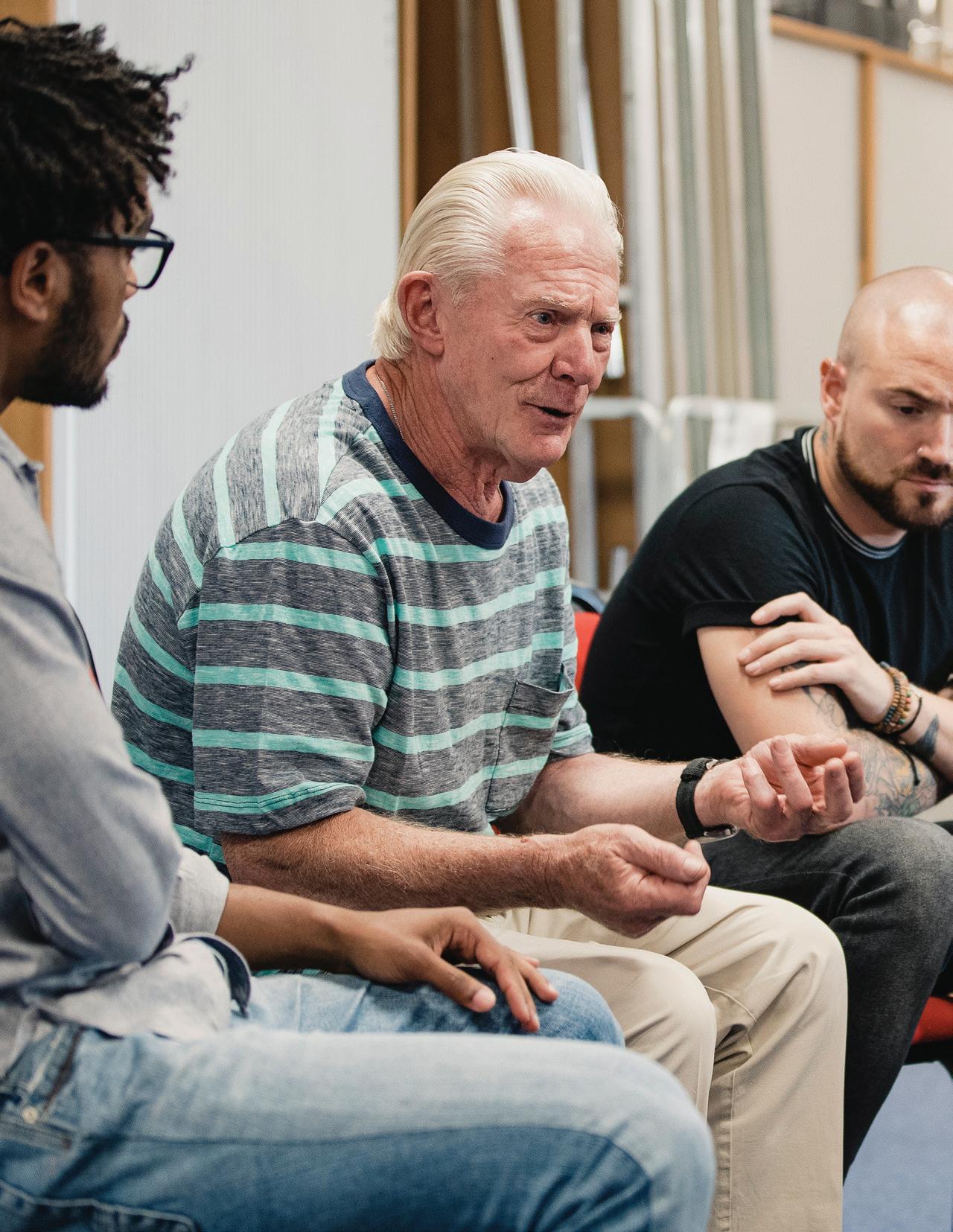
Role of Community Partners
TRANSPORTATION AND CONNECTIVITY
Connecting to health, education and employment
HOUSING
Supporting quality, affordable and safe housing
COMMUNITY CONNECTEDNESS
Building social capital and connection
SAFETY
Living free of violence, including intimate partner violence and child abuse
ECONOMIC OPPORTUNITY
Creating pathways to economic self-sufficiency
INDIANAPOLIS HAS SEEN ATTEMPTS TO CREATE, MEASURE AND SUSTAIN COMMUNITY
COLLABORATIONS FOCUSED ON IMPROVING HEALTH EQUITY. HOWEVER, LIMITATIONS IN STRATEGY, CAPACITY AND EXECUTION HAVE LED MANY TO ABANDON THEIR EFFORTS.
ESKENAZI HEALTH EXISTS AS A SYSTEM TO PROMOTE HEALTH EQUITY AND IS POSITIONED TO SEE SUCCESS.
How Eskenazi Health is different
+ Anchored by a trusted safety net health system with a reputation for serving the community
+ Health system includes 12 community health centers with integrated primary and mental health care and eight additional mental health sites throughout the city
+ Dedicated commitment by leadership to integrate medical, mental health and social care
+ Targeted neighborhoods with existing long-term investments
+ Credibility with local partners
+ System-wide electronic health records coupled with data expertise
+ Capacity to screen, refer and integrate care far into the future
Limitations of other models
• Initiatives shuttered due to financing
• Distracted by other priorities
• Short-term funding
• Limited community engagement
• Mistrust of efforts led by government or industry
• Limited infrastructure
• Limited track record of collaboration
• Limited access to data
• Uncertainty of how to measure success
• Lack of experience in complex biopsychosocial interventions
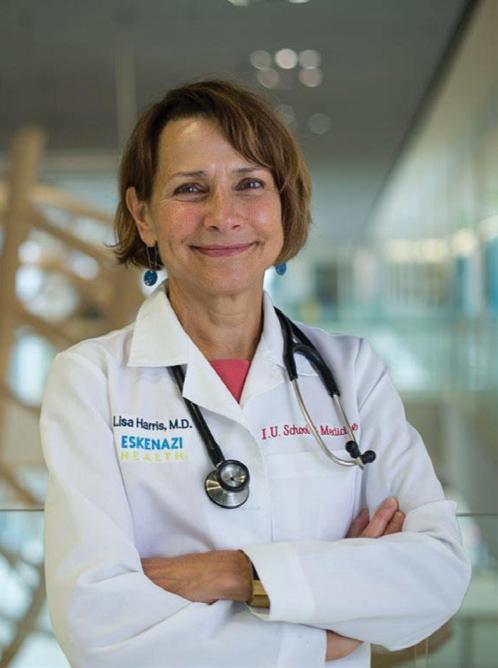
Since 1859, Eskenazi Health has stood for health equity; it's why we're here.
Safeguarding such an important mission requires a long-term commitment to a different approach. Fulfilling the physical and mental health needs of all the residents of our community is the focus for Eskenazi Health. This is what we do.
Built on evidence-based principles and past successes, the elements of this campaign will revolutionize how we care for our community by addressing major underlying causes of health inequity: access to health care, access to mental health care and access to nutritious food.
Our goal is to increase life expectancy for neighborhood residents by creating high quality, place-based care that addresses systemic barriers to health in addition to traditional medical care. Through capacity built over decades, we are in a unique position—a position to lead, to partner with local residents, businesses and community leaders enhancing our efforts to permanently and dramatically improve quality of life and life expectancy for this generation and the next. Please consider joining us and our generous donors in this critically important work.
LISA E. HARRIS, M.D. CEO, Eskenazi HealthAssociate Dean for Eskenazi Health Affairs and Professor of Medicine, Indiana University School of Medicine
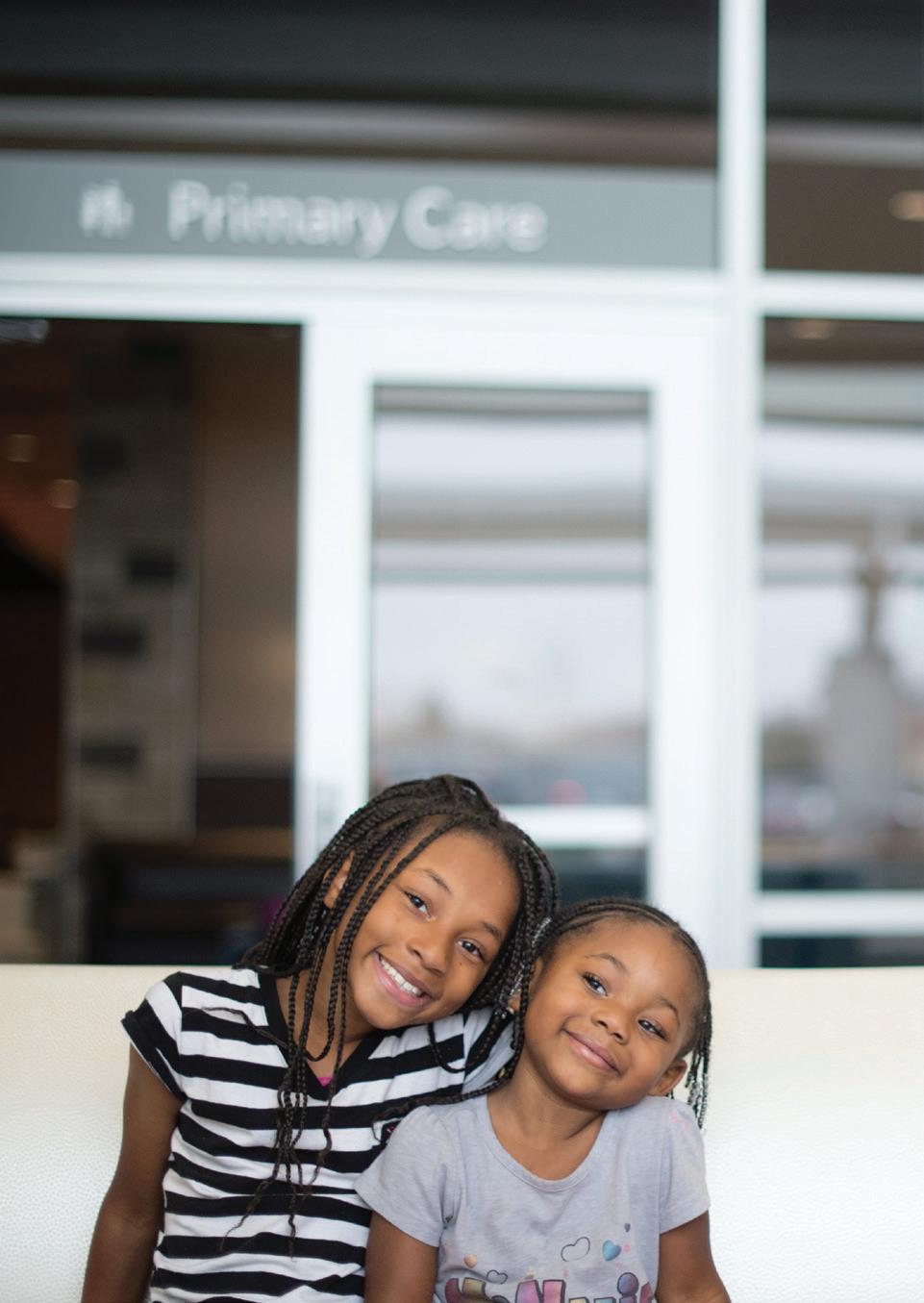
This model is not intended to research or retest the known principles for social determinants of health.
This is about activating those principles to dramatically improve longevity and quality of life. This is unlike any other health equity zone project that exists. For the first time, an anchor institution that possesses the infrastructure, capacity and individualized approach will lead. However, alone we are not enough. Partnerships, proper funding and philanthropy must be at the table for this comprehensive model to succeed.
CHRISTOPHER M. CALLAHAN, M.D. Chief Research and Development Officer, Eskenazi Health Professor ofMedicine, Indiana University School of Medicine
• Longstanding community trust
• Health care quality
• State-of-the-art facilities
• Neighborhood-based primary and mental health care
• System-wide electronic health records
• Innovation in interprofessional care teams
• Credibility with communitybased organizations
• Focused leadership for community partnerships and social determinants of health
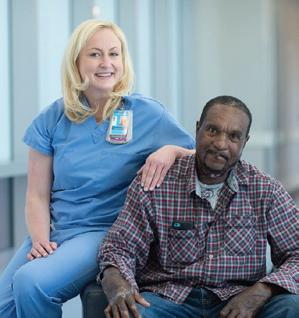
• Screening and referral for social determinants of health
• A range of transitional and supportive housing options
• Behavioral Health Academy
• Community health workers
• Community weavers that build the social fabric of support
• Mind-Body Medicine
• Lifestyle Medicine
• Increase availability, accessibility and reception to community-based doulas
• Food logistics partnerships
• Co-located clinic, food pantry and diet education
• Group education sessions to improve health behaviors
• Medically-Tailored Meals
• Fresh for You Market at the Frank & Katrina Basile Pavilion
• Fresh for You Market on Wheels
• SNAP enrollment support


ESKENAZI HEALTH HAS LAID THE FOUNDATION TO CHANGE JENNIFER'S STORY. CURRENTLY, THIS SYSTEM OFFERS BETTER ACCESS TO CARE THAN MANY OTHERS, BUT ESKENAZI HEALTH KNOWS THAT MORE IMPROVEMENTS ARE NEEDED TO ACHIEVE ASTONISHING RESULTS.
Patient story continued from page 10
We are back at the pediatrician’s office for well checks. Aria is nine months and Harper just turned 12. Before this appointment, I got forms to complete on my phone, which is working again! This form asked things like ‘Within the past 12 months, were you worried that your food would run out before you got the money to buy more?’ and ‘In the last 12 months, was there a time when you did not have a steady place to sleep or slept in a shelter (including now)?’ I really hope that these questions will help our family.
I still don’t have a stable place for us to live, and I have been struggling to find part time jobs. Nothing pays enough for me to pay a babysitter and after-school childcare. Harper
is back in school thanks to our medical team arranging a care conference with her school.
I miss Isaiah and I often wonder how different our lives would be if he hadn’t died. Every week, I meet with Sandra Eskenazi Mental Health Center counselors, and I am starting to feel better. Isaiah would be proud of how hard I am working to make everything okay for our daughters.
During our appointment, the pediatrician diagnosed Harper with pre-diabetes. She explained that Harper needs a healthier diet and more exercise, or she could develop diabetes. She knows I am struggling to buy enough food, and it is usually cheaper items from the nearby gas station. The health care team
recommended I enroll in SNAP (Supplemental Nutrition Assistance Program) and gave me a “Food Is Medicine” referral. At the food pantry in the health center, we were able to get fresh produce we haven’t been able to afford in a long time. Apples are Harper's favorite and Aria loves mashed up bananas. I will keep using the food pantry until I can supply the healthy food my daughters need. We are joining a group called “Food is Medicine” with my medical team, a dietitian and a Healthy Me Coach.
Our pediatrician is certain we are able to reverse the diagnosis of pre-diabetes by having access to a healthier diet and regular exercise. I don’t feel safe taking my girls out to walk in our neighborhood; there was a shooting in our apartment complex and there are no sidewalks. I am worried about Harper. My father died of diabetes and kidney failure at 48. We need to make changes so my daughters can avoid diabetes. The clinic social worker helped me apply for childcare assistance and the Medical Legal Partnership provided me with housing assistance. I am hoping to find a job with regular income so I can better care for my family.
Continued on page 34
Socioeconomic condition directly correlates to health.
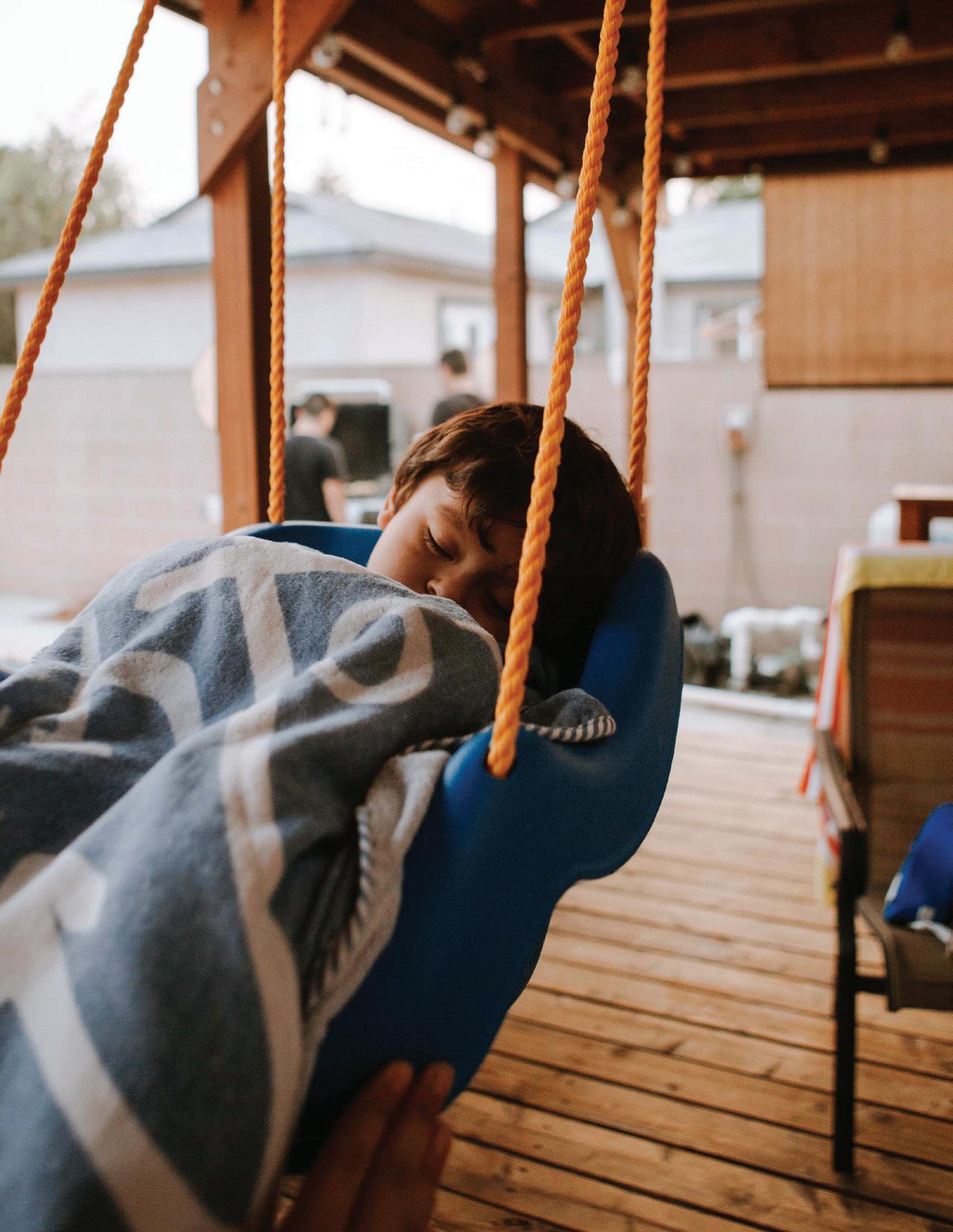
89th 78th OF INDIANA’S 92 COUNTIES, MARION COUNTY RANKS IN HEALTH FACTORS IN HEALTH OUTCOMES
19.4 % OF THE POPULATION LIVES BELOW THE FEDERAL POVERTY LEVEL
THE MEDIAN HOUSEHOLD INCOME IS NEARLY $11,000 less THAN THE NATIONAL AVERAGE
FOR ALL Bring efforts to scale at the level of entire neighborhoods
The future with Health Equity Zones unleashes the potential for major growth in community-based partnerships and collaborations to:
• Create a framework to successfully implement more Health Equity Zones across the city
• Bring recognition of Eskenazi Health Center clinics as hubs for integrating medical, mental health and social care and connecting with community assets and partners
• Prioritizing community engagement and input in Health Equity Zone decision making
• Demonstrate proof-of-concept and scalability to health care payors
• Advance economic opportunity by way of:
» Local procurement
» Paying all staff a living wage
» Community hiring and internships
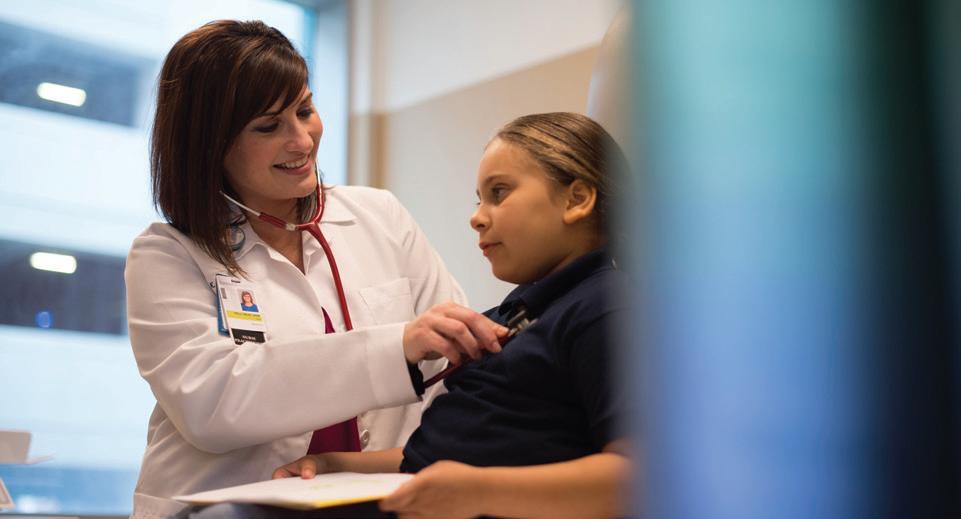

WHAT DOES 2025 LOOK LIKE IN INDIANAPOLIS?
It starts with three fully functioning Health Equity Zones. Imagine this work will create neighborhoods where…
A SINGLE MOTHER only has to take one day off work to receive physical, mental and social care all in one place.
A COMMUNITY with doctors available to see a patient whenever needed.
A SEAMLESS COLLABORATION with schools, transportation and others exists.
A PHONE CALL changes life for the better.
Ultimately, in 2025, Eskenazi Health will have demonstrated proof-ofconcept and scalability of this model, and people’s lives will be better.
This is a vibrant, diverse neighborhood with a long history of strong community ties and welcoming newcomers. Community leaders work tirelessly to support small businesses and new immigrant entrepreneurs. The area has a large, highly diverse minority population, including many with limited English proficiency. The neighborhood experiences high levels of poverty, unemployment and low high school graduation rates. At the hub, Eskenazi Health Center West 38th Street serves the highest volume of patients in the network.
1 2
The intersection of East 38th Street and Arlington Street is the epicenter of the Northeast Corridor. The unemployment rate here is five times higher than elsewhere in the County, which contributes to a prevalence of gun violence. Nearly half of neighborhood residents are spending more than 30% of their income on housing. The Northeast Corridor is known for strong community leadership, with a key asset in the significant faith-based institutions that undergird the health of the community. The new Thomas & Arlene Grande Campus will serve as an anchor for this Health Equity Zone.
3
The Grassy Creek neighborhood is young and full of promise. Home to 40,000 people, it showcases an incredible diversity, from Haitian Creole to Hispanic, from African American to Indian. With nearly half the population living more than a mile from a supermarket and poor neighborhood walkability, transportation is a significant challenge expected to improve with IndyGo’s new Purple Line Bus Rapid Transit route. The neighborhood is known for its great community collaboration, anchored by several nonprofits and faith-based efforts, and has been home to the Eskenazi Health Center Grassy Creek since 1999.
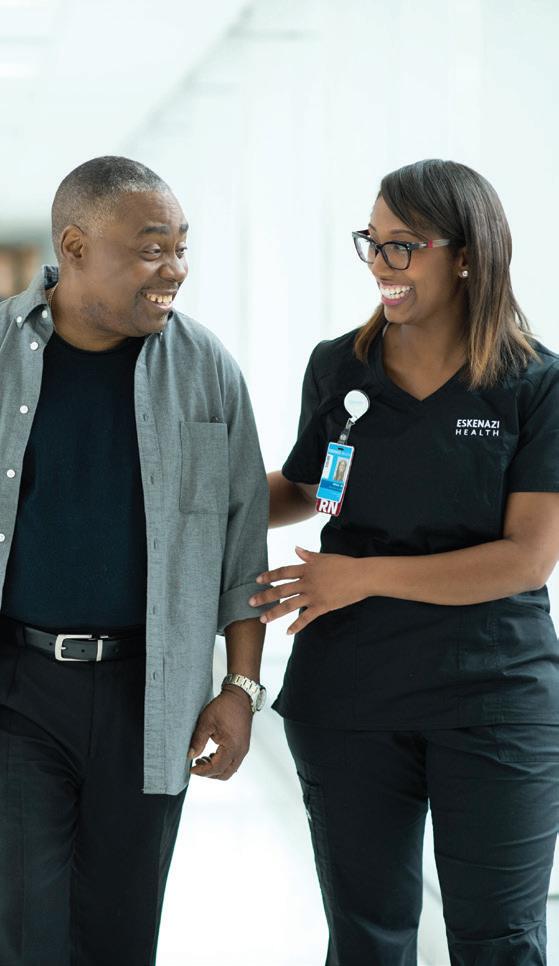

…IT’S ABOUT EVOLVING AND IMPROVING THE PROCESS THROUGHOUT THIS INITIATIVE. AS ESKENAZI HEALTH REACHES MORE PEOPLE WHO TRULY NEED HELP AND HAS A GREATER UNDERSTANDING OF EACH COMMUNITY'S RESOURCES, IT WILL BECOME CLEARER HOW TO BEST CONTRIBUTE TO MEETING THOSE NEEDS. THE INITIAL GOALS FOR THE MODEL ARE FOCUSED ON FOUR OBJECTIVES:
Eskenazi Health is excited to launch the work of three initial Health Equity Zones, with a 2025 goal to:
• Formally partner with community organizations as fully operationalized and functioning governance structures
• Demonstrate collaboration between the Eskenazi Health Center clinics and local partners
By 2025, Eskenazi Health strives to:
• Provide a structure to significantly increase the percentage of patients screened for social determinants of health
• Provide referrals to internal or external resources to address patient needs
• Increase the number of patients reporting their social care need has been resolved and they no longer need services or interventions

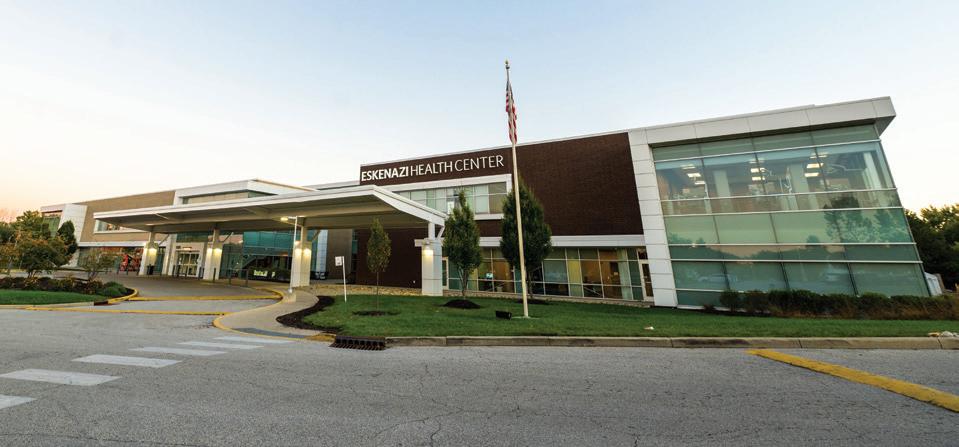
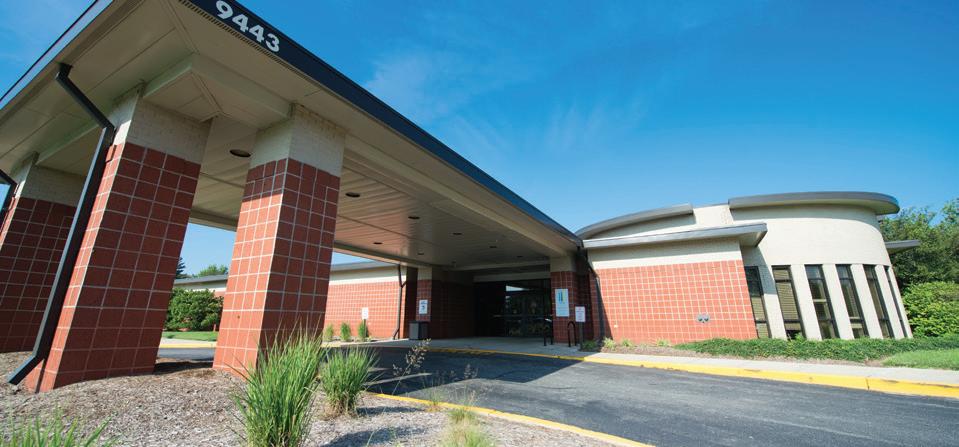 New Thomas & Arlene Grande Campus
Eskenazi Health Center West 38th Street
New Thomas & Arlene Grande Campus
Eskenazi Health Center West 38th Street
Eskenazi Health has the greatest opportunity to improve lives by integrating medical and mental health care. Aggressive goals for 2025 include:
• Increase the rate of screening and treatment for anxiety and depression by implementing a state-of-the-art collaborative care model at each Eskenazi Health Center site in the Health Equity Zones
• Increase the number of leaders within each zone trained in Mind Body Medicine
• Increase the number of patients cared for by Sandra Eskenazi Mental Health Center who are co-managed within an Eskenazi Health Center clinic
• Increase the number of participants in the Behavioral Health Academy to grow the mental health care workforce and meet the needs of patients

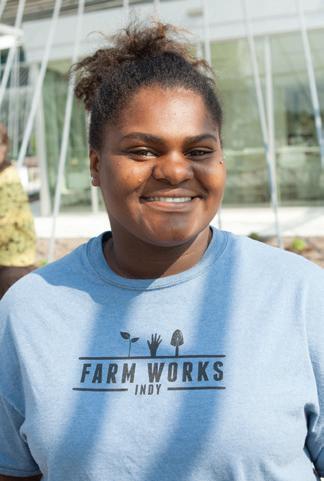
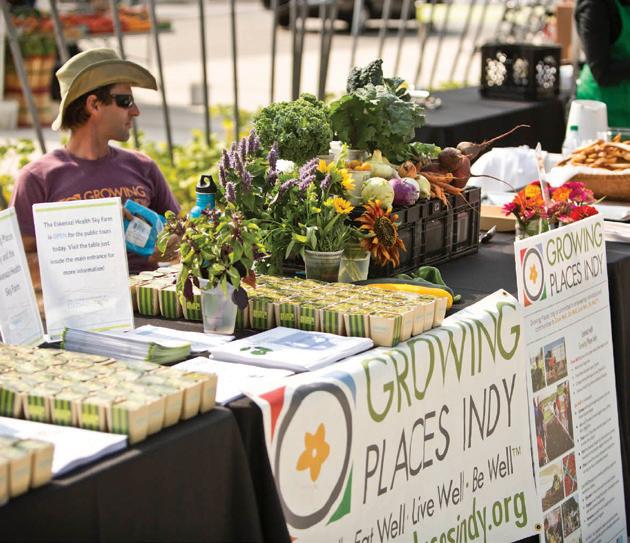
Our popular and successful Food as Medicine programs move people from food insecurity to stable, nutritious diets. By 2025, Eskenazi Health aims to:
• Increase the number of program participants and demonstrate improved health metrics among participants
• Expand Medically-Tailored Meals program for the community
• Increase enrollment of SNAP eligible patients
• Sustain financial viability to sustain the Food as Medicine program
BASIC ACCESS TO CARE IS ONE OF OUR REGION’S GREATEST UNMET NEEDS. PROXIMITY, TRANSPORTATION, AFFORDABILITY AND EDUCATION CONTINUE TO BE BARRIERS OUR MOST VULNERABLE NEIGHBORS SIMPLY CANNOT OVERCOME ON THEIR OWN. REACHING PEOPLE REQUIRES INVESTMENT IN BOTH INFRASTRUCTURE AND PROGRAMMING.
Strategies
• Support new programming and innovative ways to care for people in the neighborhoods surrounding primary care center clinics
• Engage with education, transportation, housing, public health and other industries to expand existing programming for areas and departments throughout Eskenazi Health
Investments
• Create and support new programming and services at the three Health Equity Zones
• Foster innovation and improve excellence in primary care and specialty care
Outcomes
• Improved early detection and services which lead to increased longevity
• Integrated mental and physical health for increased overall well-being
• Improved care beyond clinic walls to lower health disparities
Many people in our community experience health disparities as a result of inequitable access to health care and human service resources. We need to be continually asking: what health equity challenges do our patients face and how are we, as a department, as a school of medicine, as an organization, as a public hospital, and the community at large, addressing these challenges? Everyone should have a fair and just opportunity to be healthy. It is our responsibility to do so. Eskenazi Health recognizes this.
VIRGINIA CAINE, M.D. Director,Marion County Public Health Department Associate Professor, Indiana University School of Medicine
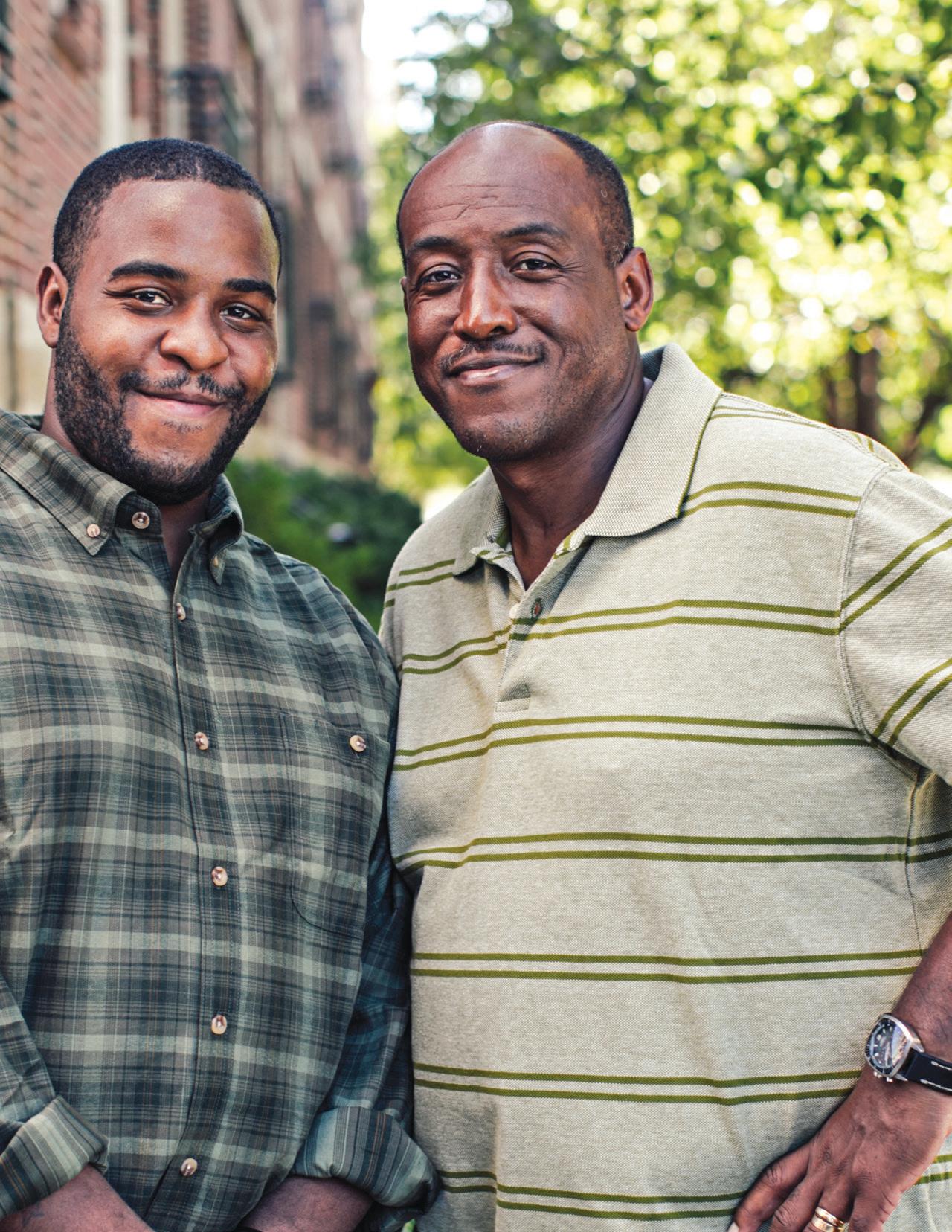
Not having affordable, local access to preventive, holistic, quality care has crippling effects. 25%
OF PATIENTS HAVE HIGH BLOOD PRESSURE; ONLY
50.7% IS CONTROLLED 13% OF PATIENTS HAVE DIABETES; ONLY 38% IS CONTROLLED 9% OF PATIENTS ARE UNINSURED 64% ARE ON MEDICAID
THERE IS NO HEALTH WITHOUT MENTAL HEALTH. PSYCHOLOGICAL STRESS AND TRAUMA OF THE PANDEMIC COMBINED WITH PROVIDER SHORTAGES HAVE LEFT OUR COMMUNITY IN DIRE NEED OF IMMEDIATE HELP. THE SANDRA ESKENAZI MENTAL HEALTH CENTER SERVES MORE STATE-SUPPORTED PATIENTS IN MARION COUNTY THAN ANY OTHER COMMUNITY MENTAL HEALTH CENTER. HOWEVER, CURRENT CAPACITY LIMITS THOSE SERVED TO 16,000 PEOPLE PER YEAR.
Strategies
• Expand access and increase available service hours to meet the growing demand
• Recruit and retain specialists while building an internal pipeline of master’s-prepared therapists
• Upgrade and expand facility capacity to treat more patients
Investments
• Replace the current Narcotics Treatment facility with a new building to expand capacity
• Expand the Behavioral Health Academy at Eskenazi Health
• Renovate existing Sandra Eskenazi Mental Health Center facilities to reflect the care environment Central Indiana residents have come to expect from Eskenazi Health
• Invest in innovation and technology to reach more patients effectively
Outcomes
• Improved capacity will enable care for those currently not able to access it
• Improved pipeline of trained providers will work to offset current and future community needs
• Integrated mental and physical care for a healthier, safer and more prosperous community
We are in a mental health crisis. The lack of a sufficient behavioral health workforce has dire economic, medical, social and quality of life costs, especially with the increasing number of people who need mental health care. A variety of approaches are needed to mitigate the growing need for mental health services: workforce development, integrated mental health services and public health prevention strategies are all important opportunities to address our current crisis.
ASHLEYOVERLEY, M.D.
Chief Executive Officer, Sandra Eskenazi Mental Health Center
Assistant Professor of Clinical Psychiatry, Indiana University School of Medicine
Lack of access to mental health care can result in increased mortality including an increased risk for suicide, decreased quality of life and worsened physical health.
62 % OF ADULT PATIENTS AT SANDRA ESKENAZI MENTAL HEALTH CENTER ARE UNEMPLOYED NEARLY

MARION COUNTY ESTIMATES NEARLY
67,000
INDIVIDUALS SUFFER FROM SUBSTANCE ABUSE DISORDER
1 in 4
INDIANAPOLIS ADULTS EXPERIENCES A MENTAL ILLNESS IN A GIVEN YEAR
THE INABILITY TO OBTAIN NUTRITIOUS FOOD CONTRIBUTES TO THE MAJORITY OF CHRONIC HEALTH CONDITIONS, INCLUDING OBESITY, DIABETES AND HEART DISEASE. IT ALSO IMPACTS A PERSON’S MENTAL WELLBEING. FOR CHILDREN AND ADULTS ALIKE, OVERCOMING THIS HURDLE IS TRULY A MOMENT-TO-MOMENT STRUGGLE. KEEPING PATIENTS FROM THE EMERGENCY DEPARTMENT REQUIRES KEEPING NUTRITIOUS FOOD IN THEIR HOMES AND LIVES.
Strategies
• Establish more Fresh For You Markets, not just at Eskenazi Health facilities, but throughout the city
• Work with community partners to distribute nutritious food
• Lead a hands-on approach with community partners to educate and improve healthful alternatives and choices
Investments
• Hire two employees at each Eskenazi Health Center clinic to enroll food-insecure patients in SNAP (Supplemental Nutrition Assistance Program)
• Expand the food prescription program to additional Eskenazi Health Center clinics so food-insecure patients can purchase healthy food at local grocery stores
Outcomes
• Improved access to nutritious foods for those who need it most urgently
• A sustainable, evidence-based action plan developed with community partners
Eskenazi Health and Gleaners Food Bank share a common vision of improving our community’s health through the integration of social and medical care. The missions of Gleaners and Eskenazi Health are increasingly intertwined, just as there is compelling evidence that the food people eat, or don’t eat, increases the risks of the top ten chronic health conditions in this country. We look forward to working with Eskenazi Health to eliminate an unacceptable meal gap that has persisted for decades to improve nutrition through innovations that capitalize on our combined strengths for the benefit of our neighbors.
JOHN ELLIOTT President and CEO, Gleaners Food Bank ofIndiana
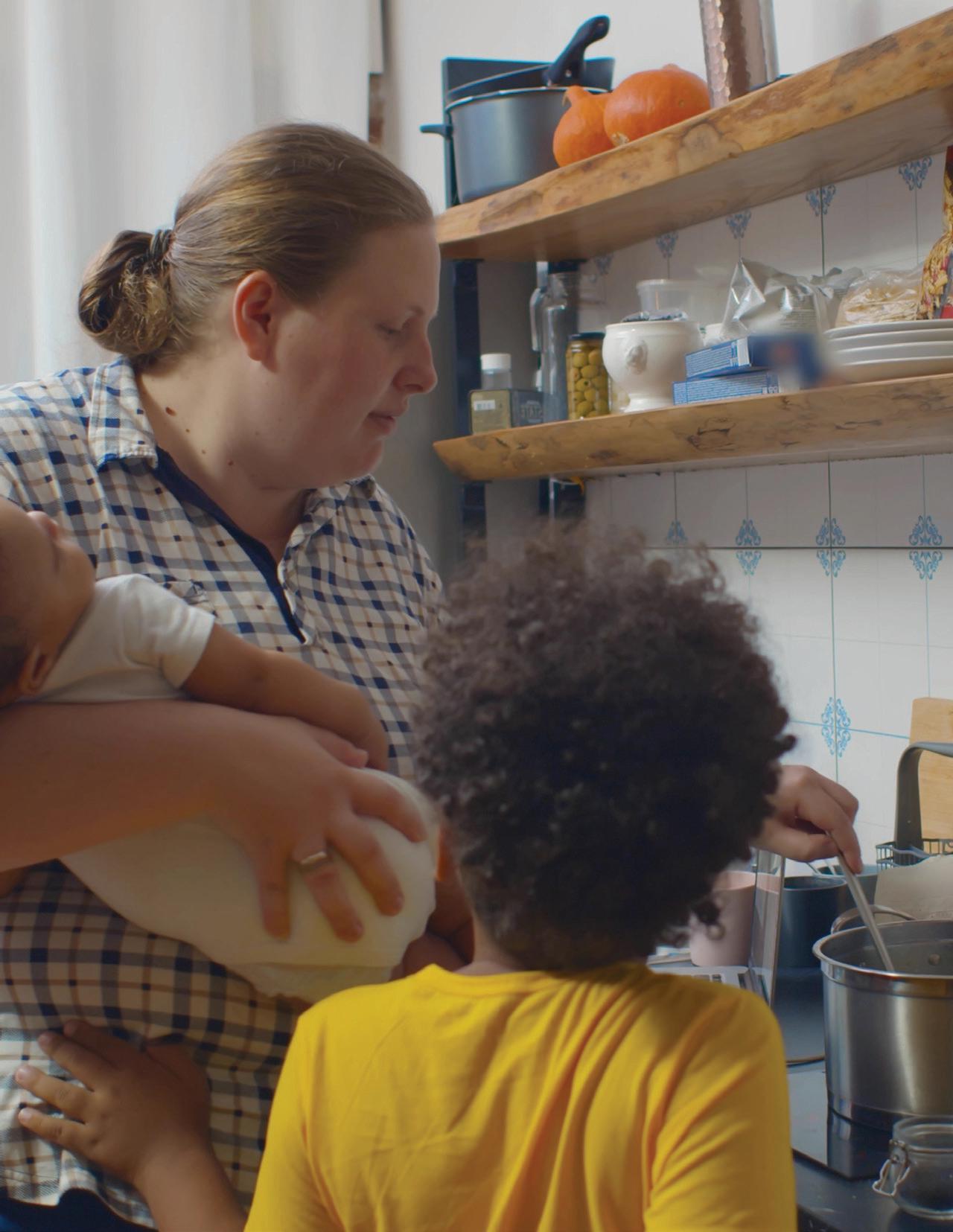
Food is medicine. The ability to afford and obtain nutritious food impacts physical and mental wellbeing like nothing else.
21% OF MARION COUNTY RESIDENTS LIVE IN A FOOD DESERT ABOUT 41% OF CHILDREN UNDER THE AGE OF FIVE SUFFER FROM MALNUTRITION IN INDIANAPOLIS, IN EARLY 2020, BEFORE THE PANDEMIC, THERE WERE NEARLY
200,000 IDENTIFIED FOOD INSECURE INDIVIDUALS IN MARION COUNTY
THIS IS THE FUTURE THAT SHOULD BE AVAILABLE TO EVERYONE IN INDIANAPOLIS. JENNIFER'S STORY BELOW IS WHAT HEALTH CARE CAN LOOK LIKE, WITH ESKENAZI HEALTH CENTER CLINICS AT THE CORE, WORKING IN CONJUNCTION WITH AVAILABLE RESOURCES TO IMPROVE FAMILIES' HEALTH AND LIVES.
Patient story continued from page 18
Today was a great day! Not only did Aria take her first steps, but my life is drastically different from a year ago.
Mary, the Community Weaver at Eskenazi Health Center clinic has made sure that Harper, Aria and I all have appointments today. She also connected me with a financial counselor to help me get health insurance coverage, and I am finally able to have my own health screening done for diabetes, cervical cancer and other recommended preventive care.
At the follow-up with my counselor at Sandra Eskenazi Mental Health Center, we decided I am doing so well I no longer need weekly counseling visits, but I can always schedule a visit.
Just like last time, I got forms before our appointments today. As I answered the questions, it was nice to think about how far I have come. I still can’t always afford the diapers for Aria. But since the clinic has been asking, Mary helped me get a package of diapers from Indiana Diaper Bank before I left the visit today.
I was so excited to tell the medical assistant, Anna, that I just received CCDF (Child Care Development Funds) for childcare and I can start my new full-time job with great pay and benefits. Mary used Eskenazi Health's network to help me find this job.
All of us finally feel safe now that we are in our own little apartment. I love tucking the girls into bed each night after reading one of our “Reach Out and Read” books from her doctor visits.

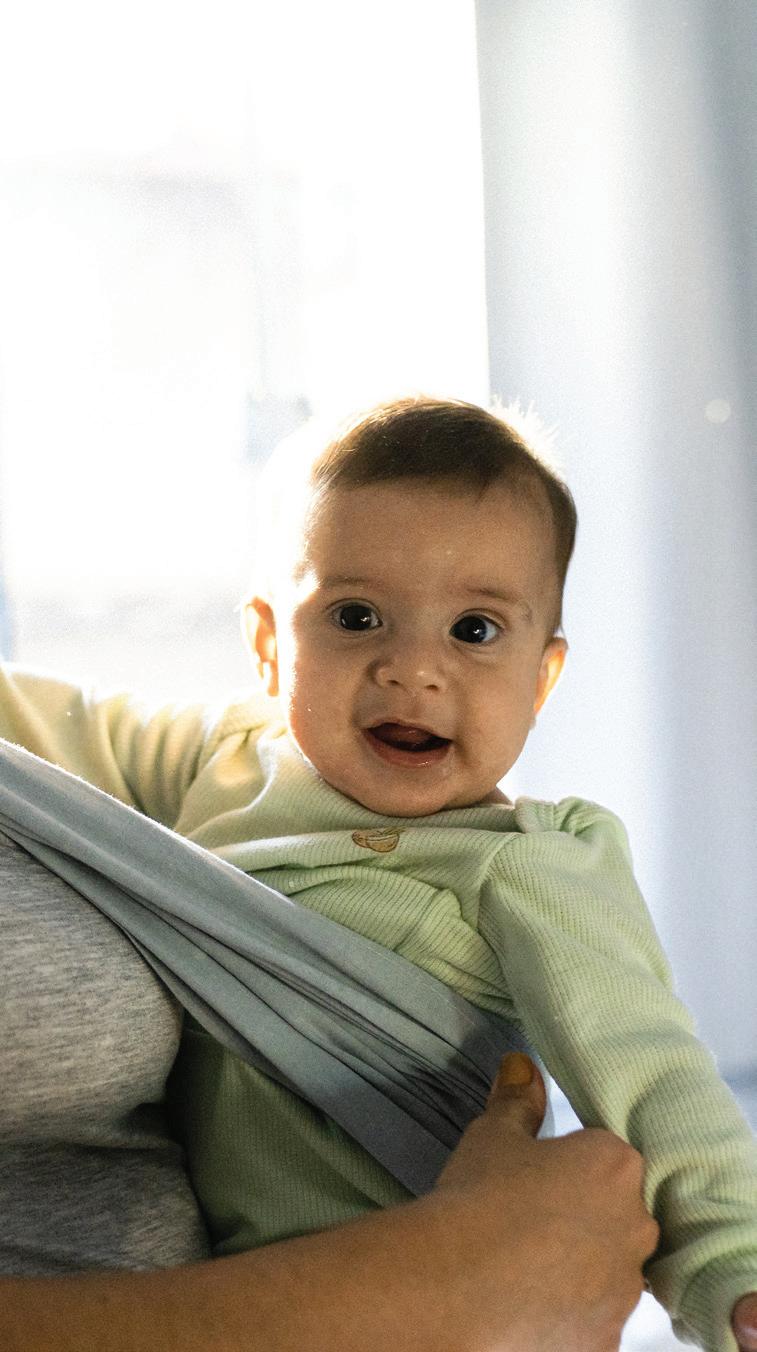
Best of all is the news about Harper: She no longer has prediabetes! Her weight is on track for her height and her lab tests are all normal. I am not only able to provide enough food so we aren’t hungry, but also able to prepare healthy meals from food I afford with help from SNAP, the WIC program, and the Fresh for You Market at the Frank & Katrina Basile Pavilion. Eskenazi Health partnered with my neighborhood to improve the parks and walking areas. All three of us now join the weekly Eskenazi Health Wellness Walks on a new walking trail by the clinic. I am saving up for my own vehicle, but I appreciate the Eskenazi Health Transportation Department assistance for getting us to our medical and mental health appointments.
This journey would have been so much different without Phyllis, the Eskenazi Health Community Health Worker. She started visiting me when I was at my lowest point and she has become an important part of our family. She helped me overcome so many hurdles when I did not even know where to start. I love that Phyllis, Mary and Anna all know so much about Eskenazi Health to connect me with so many organizations and people who have walked with me during my darkest hours. I love my neighborhood and my community health center! I see a bright future ahead for me and my daughters.


YOU are the stewards of our public hospital. You have always been there, building our new downtown campus, supporting the expansion of programs and services we offer and caring for the most vulnerable among us.
Donor generosity has brought Eskenazi Health and our community to where we are, and now is the time for us to take the next step—together. We invite you to stand with us as we build the healthy communities everyone deserves, those in which each of us has the opportunity to experience our fullest and most vibrant life.
ERNEST VARGO II, CFRE President and CEO, Eskenazi Health FoundationDennis D. Oklak – Chair
Deborah J. Daniels – Vice-Chair
Sharon R. Barner – Secretary
Mark C. Gargula – Treasurer
William J. McCarthy – Immediate Past Chair
Paul T. Babcock
Charlene A. Barnette
Andrew T. Bridge, M.D.
Virginia A. Caine, M.D.
Darrianne P. Christian
Kiamesha-Sylvia Colom
David W. Crabb, M.D.
Sherry D. Davis
Sandra A. Eskenazi
Sarah S. Faller
Alessandro Franchi
Thomas J. Grande
Lisa E. Harris, M.D.
Kevin P. Hipskind
J. Mark Howell
Robert W. Lazard
Wayne E. Patrick
Benjamin A. Pecar
Thomas J. Pence
Barton R. Peterson
Myrta J. Pulliam
Julie M. Qualkinbush
Alice Kingsbury Schloss
John T. Thompson
John F. Ackerman – Co-Chair
Charlene A. Barnette – Co-Chair
J. Mark Howell – Co-Chair
John T. Thompson – Co-Chair
Sharon Barner
David Crabb, M.D.
Sarah Faller
Kevin P. Hipskind
William J. McCarthy
Dennis D. Oklak
Myrta J. Pulliam
Michael L. Smith
Ex-Officio
Lisa E. Harris, M.D.
Ernest Vargo II